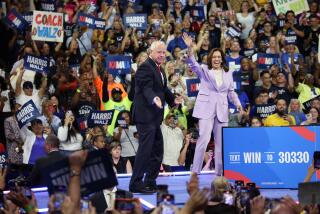Robert Trout: 52 Years of Convention Coverage
- Share via
NEW YORK — The year was 1936, the convention Republican, the nominee Alf Landon. It might have been the first time politicians thought of scheduling their conclaves for broadcast in prime time, said Robert Trout.
He was there for CBS radio. Earlier this week, at age 78, he was in New Orleans for ABC Radio News, covering his 28th convention, the GOP gathering that nominated George Bush for President.
Prime-time conventioneering, tailored for television, has become routine. But in 1936, the idea of holding a convention session at night to get the radio audience at home was akin to a bulb slowly lighting.
“The politicians were beginning to get the message, having been instructed by President Franklin Roosevelt and his use of radio,” Trout said, referring to Roosevelt’s famed “fireside chats” to the nation on radio.
“They were getting the idea there’s a big audience out there. So at the 1936 GOP convention in Cleveland they scheduled sessions at night in addition to those in the day. Not instead of, but in addition to.
“That was the first sign of their . . . slide towards being tailored for broadcasting. But it was a very slow slide until television came along, and then it became increasingly fast.”
The phrase gavel-to-gavel coverage didn’t exist then, but that’s how the conventions generally were covered, Trout said in a telephone interview Thursday from his New Orleans anchor booth.
More than a few critics hollered at ABC four years ago for cutting away one night from the Democratic convention to air an entertainment show.
Hark back to the 1936 conventions.
“At nighttime, if there was a really important half-hour commercial program, we’d cut away and put it on, unless something really big was happening,” Trout said.
Some network news producers this week complained about what seemed the endless roll call of state delegations in Wednesday night’s GOP session.
But that roll call was small potatoes compared to the Democratic one of 1936 that led to Roosevelt’s renomination by his party, Trout recalled.
“There wasn’t much to do, and everyone wanted to second his nomination . . . there were 54 seconding speeches that night,” he said. Wednesday’s long roll call “was brief, compared to the people who got up without any time limit” in the Great Seconding of 1936.
Day or night, the convention broadcasts of that year were what network folk called “sustaining”--without commercials. That would be amazing now. Not so then, Trout said.
“Nobody ever dreamed of trying to sell them and make money on them. It was just considered one of the things networks had to do in order to keep their licenses and show they were devoted to public service.”
Trout, who in his CBS career anchored on radio and television, and joined ABC News in 1974, is resigned to the fact that air time for coverage of the conventions has gone down, likewise the ratings.
“I guess it’s inevitable . . . but it would be terrible not to broadcast them at all,” he said.
More to Read
The complete guide to home viewing
Get Screen Gab for everything about the TV shows and streaming movies everyone’s talking about.
You may occasionally receive promotional content from the Los Angeles Times.






